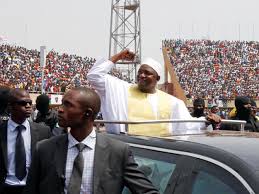It is highly likely, that the Gambia’s 2021 presidential election will be organized under the “Jammeh’s constitution”. Important reforms and anti-corruption efforts could be undermined. Several foreign partners who have provided the Gambia with significant financial and technical support to enact reforms may now consider diverting their resources and attention elsewhere.
During his 21 year rule, previous Gambian President Yahya Jammeh amended the constitution 50 times. He removed term limits and changed the requirement for electoral victory from an absolute majority to a plurality – in order to consolidate his power. It was therefore a national priority when President Adama Barrow came to office in 2017 to replace what many referred to as “Jammeh’s constitution”.
Replacing it was considered as one of President Adama Barrow’s priorities. Near 70% of Gambians supported the new constitutional bill, which would also limit presidents to two five-year terms (87% support); require the National Assembly to approve ministerial appointments (86%); mandate a quota system for women’s representation among lawmakers (85%); and require the winner to gain an absolute majority in the presidential election (72%). According to 2018 Afrobarometer survey, 87% of Gambians agreed the country needs a new constitution. 60% rated the CRC’s work positively. And 74% said they intended to vote.
The process of writing the new Constitutional draft began in June 2018 when the National Assembly established the Constitutional Review Commission (CRC) and Barrow appointed 11 commissioners to begin wide consultations. In the beginning of spring 2020, the CRC submitted its final draft. The draft’s cost appeared to be D116 million.
The new constitution was planned to go to a referendum in 2021. It looks like the Kenyan Constitution of 2010.
The 2020 Constitution Promulgation Bill was expected to introduce significant changes, including term limits, quotas for participation of women and the curtailment of executive powers. Moreover, it would have marked a clear break with the two-decade long rule of dictator, former president Yahya Jammeh. So, on September 22, 2020, a landmark bill to replace the constitution was defeated by the National Assembly. 23 members of the Gambia’s 56-member National Assembly rejected the bill in its totality. For it to pass, it would have needed the approval of 75% of members.
Most of those who opposed the bill are close to President Barrow and members of the Alliance for Patriotic Reorientation and Construction (APRC), which is former president Yahya Jammeh’s party. They have advanced a range of reasons for their reluctance to support the bill – from complaining about its language policy, to suggesting it contains too many rights, to questioning the need for a new constitution at all. It seems that these were merely distractions, however, from their key concern: allowing Barrow to stay in office.
Barrow doesn’t have any political party members in parliament and his own loyal parliamentary support because he’s just set up his National People’s Party(NPP) recently. After registering his new party in January this year, Barrow gave a clear sign that he was going to run for presidency again in 2021 despite his previous cue that he would be a one-term president. But his supporters are looking ahead to his second term. The new constitution would have strictly limited the potential length of Barrow’s presidency, especially as a transitional clause stated that the incumbent’s current term would count towards their two-term limit.
It is likely that Barrow will try to bring the draft back to the National Assembly.
According to public opinion surveys, 66% of Gambians supported this provision, but many of Barrow’s supporters did not. Meanwhile, a cabinet paper was submitted to the CRC arguing that the current term of the president should not count.The main challenges will arise with the approach of 2021. We have doubts that political parties could agree on the best way forward.Barrow’s positions depend on his ability to turn the Constitution Promulgation Bill defeat by the Parliament into a political blow to his political opponents. If successful, he can get good results at the next elections.



